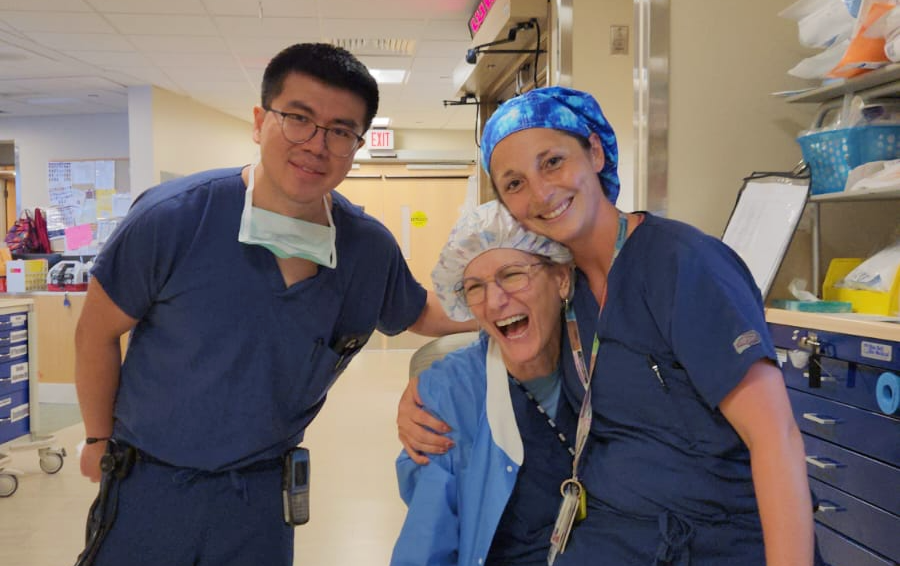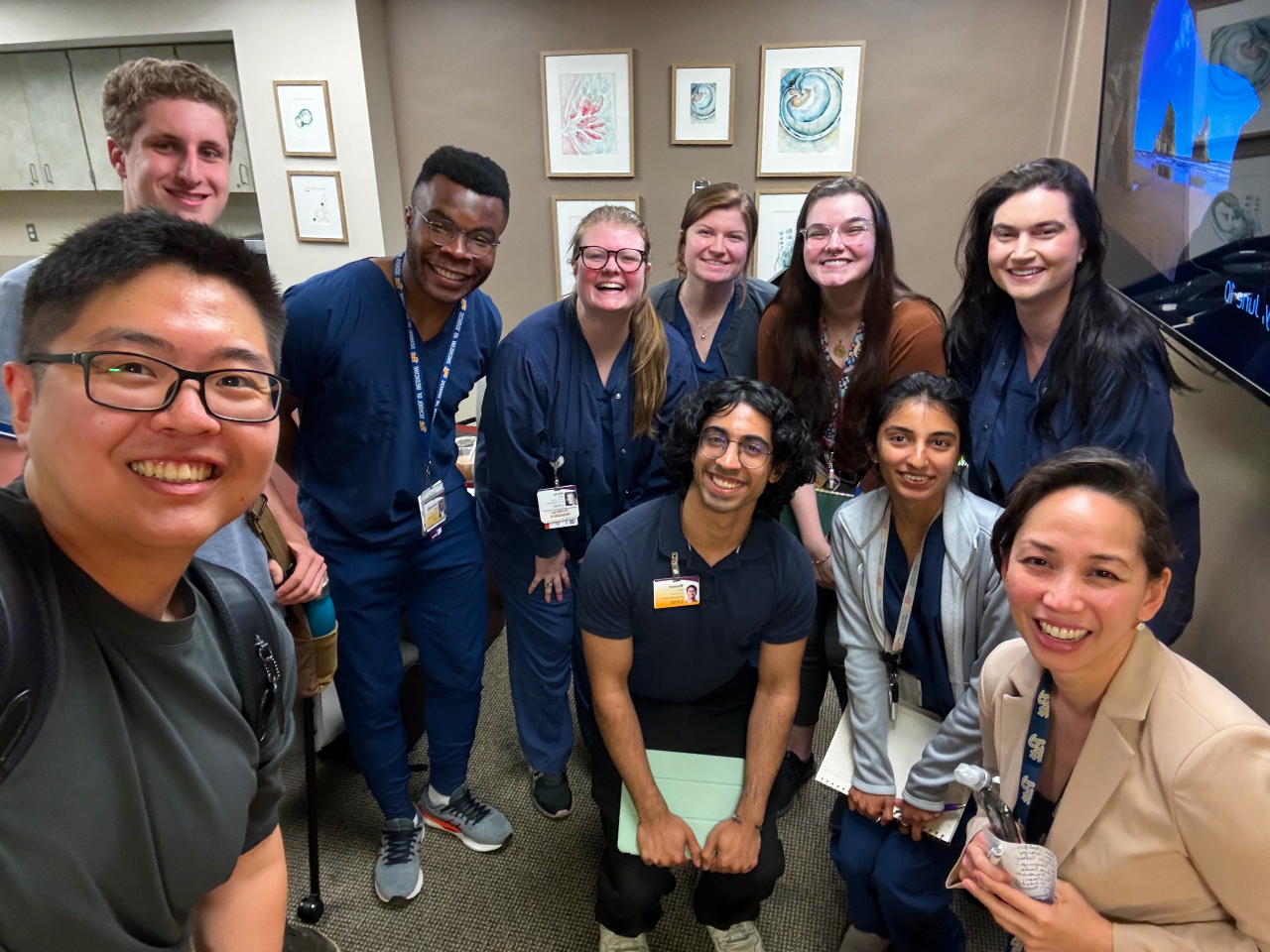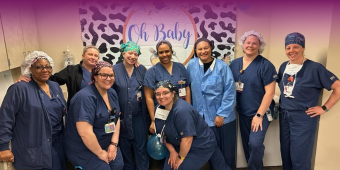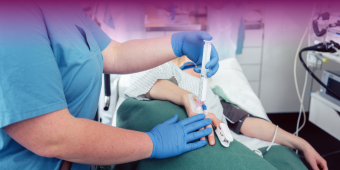
 | Joseph S. DeRenzo, MDDirector, Division of Obstetric & Women's Anesthesiology |
Welcome to The Division of Obstetric (OB) & Women’s Anesthesiology!
We provide comprehensive anesthetic and perioperative services to the region’s highest- and lowest-risk pregnancies. Our division strives to be a world leader in improving women’s and maternal health through advancing acute care medicine and science with a mission to:
- provide safe, patient-centered, and cutting-edge clinical care by leveraging a multidisciplinary team approach;
- educate the next generation of clinicians and leaders; and
- advance new knowledge, discoveries, and innovation in OB and women’s anesthesiology.
UPMC Magee-Womens Hospital (MWH) is a tertiary referral center that serves a diverse perinatal population from a wide geographic distribution, primarily spanning Pennsylvania, New York, Ohio, Western Maryland, and West Virginia. MWH is ranked one of the nation's top hospitals specializing in gynecology. The UPMC Women’s Health Service Line encompasses 15 hospitals in the UPMC network over the same five states, covering both urban and rural populations in a wide range of socioeconomic strata.
- Clinical Service

Peripartum Care
Clinical management of routine and medically complex OB patients is the foundation of the division’s work. UPMC MWH functions as the main “hub” for clinical care and is a designated Center of Excellence for Obstetric Anesthesia Care by the Society for Obstetric Anesthesia and Perinatology (SOAP). Other UPMC maternity hospitals are in the process of consideration for this prestigious designation. Consistently over 15,000 deliveries occur at UPMC hospitals, with over 50% occurring at MWH. In addition to managing labor analgesia and surgical anesthesia for deliveries, the division provides services for in- and ex-utero fetal surgeries, non-OB surgery during pregnancy, immediate post-vaginal delivery postpartum tubal ligations, peripartum management of postpartum hemorrhage, scheduled and unscheduled cesarean-hysterectomies for morbidly adherent placentation (placenta accreta), and external cephalic versions. Fetal surgeries encompass percutaneous umbilical blood sampling, fetoscopic laser photocoagulation, radiofrequency ablation of twin reversed arterial perfusion (TRAP) sequence, fetal shunt procedures with radiographic guidance, and ex utero intrapartum procedures (EXIT).
Clinical Innovation
We are invested in developing new models of clinical care and advancing clinical practice to meet the needs of the 21st century woman. We are developing new ways to provide care in rural Pennsylvania through specialized training programs to meet the challenges of providing high-quality clinical care in under-resourced local environments.
MAMA Clinic
The MAMA clinic is an antenatal consultation service aimed at supporting patients at risk of complex pain management in the peripartum period. This includes but is not limited to patients with chronic pain, active opioid or substance use disorder, history of opioid or substance use disorder, or receiving opioid agonists or medication for opioid use disorder.
Other services
- Complex Interhospital Obstetric Perioperative Management
- Perinatal Health Optimization
- Quality, Safety, and Maternal Mortality
- Education & Teaching
UPMC Magee proudly educates learners from diverse backgrounds in advanced OB anesthesia clinical practice, serving as the primary OB anesthesia clinical site for student nurse anesthetists, dental anesthesia residents, anesthesiology residents, and OB anesthesiology fellows. Our innovative education methodologies include “flipped classroom” approaches using digital lecture platforms, simulation, design thinking, and problem-based learning.
- Research & Innovation

The division has a tradition of active research on important OB anesthesia topics. Division faculty and OB fellows represent at national and international meetings of academic societies such as SOAP, the International Anesthesia Research Society (IARS), and the Association of University Anesthesiologists. Our funded projects are listed below:
Project Title Award Institution Total Funding Funding Period Reducing Pain's Impact on Perinatal Depression CTSI Pain Research Challenge/Virginia Kaufman Award $50,000 2016 – 2017 Ketamine to Reduce the Burden of Postpartum: Lactation Pharmacokinetic Trial (KINETIC) CTSI Pain Research Challenge/Virginia Kaufman Award $75,000 2018 – 2021 Genetic Variation of Labor Pain and Postpartum Depression UPitt – UGC Precision Medicine Pilot Grants $50,000 2018 – 2020 Omics Center of Acute to Chronic Pain Signatures (PNNL, Pacific Northwest Laboratories) NIH/NINDS $69,091 2019 – 2020 HEAL U24 Early Phase Pain Investigation Clinical Network – Specialized Clinical Centers NIH/NINDS $1,254,417 2019 – 2024 BRIDGE Device: Alternative Postpartum Analgesia CTSI Research Initiative for Special Populations (CRISP) $30,000 2020 – 2021 Acute to Chronic Pain Transition in Women After Mastectomy: Establishing Biosignatures for Pain Resilience and Susceptibility NIH/T32 $80,000 2021 – 2022 Avoiding Adverse Opioid Outcomes with Proactive Precision Care NIH/NIDA $319,447 2021 – 2022 TOTAL $1,927,955 - Quality & Patient Safety
OB Anesthesia Quality & Patient Safety at Magee
Our overall philosophy is collaborative care for the provision of safe, high-quality, and patient centered care, while upholding continuous improvement principles in Just Culture and a positive culture of learning. Our faculty, advanced practice providers, fellows, residents, and students participate in these initiatives.
The following is a listing of the various programs and committees within UPMC Magee-Women’s Hospital. These educational and patient safety initiatives continue to create a positive impact on anesthesiology quality and patient safety within the Woman Care Birth Center:
Committee on OB Anesthesiology Patient Safety and Quality Improvement (PSQI) - This committee reviews safety topics/trends; recommend education & practice improvement opportunities; & advises leadership on any needs to support a Culture of Safety and Just Culture. Committee will not review specific cases involving privileged information, nor replicate/conduct parallel peer reviews that occur within existing hospital and departmental structures.
- Accomplishments: standardization of airway equipment and reduction of cross contamination through the use of airway equipment boxes; regular epidural rounding; workplace safety/retractable electrical cord outlets in ORs; improved communication relating to equipment safety checks through use of white boards in ORs; multidisciplinary education/mentoring efforts (i.e. IV skills); med alerts in automated medication dispensing cabinets; accurate temperature collection data for early recognition of chorioamnionitis; intra-uterine fetal procedure updates; programmed intermittent epidural bolus education and clinical implementation; post-dural puncture headache checklists (patient educations, communication tools, increased consistency of follow ups); enhanced communication tools.
Policy Committee - This committee reviews and updates policies and procedures related to the Women’s Health Service Line of UPMC as well as regular QA/QI review of documented PPH cases
QA/QI Committee - Regularly meets to review cases with opportunities for risk/service recovery
- Advises CME/CEU activities based on peer review
OBOR & Anesthesiology Subcommittee - Multidisciplinary committee consisting of local leaders and educators from obstetrics, anesthesia, and nursing; collaborative effort to improve efficiency workflow, patient safety, the patient experience, and ensure just culture across all teams within the birth center.
OB Anesthesia Education Committee - Continuous education with quarterly education topics presented to nursing staff and other ad hoc resources to disseminate updated practices to new nursing and anesthesia staff. Projects have included arterial line resource for the obstetric high-dependency unit; OB nursing resource binder relating to anesthesia practices and collaboration points; IV mentorship of OB nursing by anesthesia providers
Simulation Training - In collaboration with WISER, we support several simulation programs NARAT, OB Anesthesia Critical Scenario Course, OCTT, and OB Anesthesia Ongoing Professional Training (asynchronous course).
Quality Improvement (QI) Project Incentive Program - Physician and CRNA collaboration on QI projects that have enhanced patient experience, clinical outcomes, clinical care coordination, clinical team safety, and clinical education and training. Locally at Magee, sponsored projects have included: Creation of Post-Dural Puncture Headache Patient Education Pamphlet, translated into several languages and available across the Women’s Health Service Line; Implementation of the “Pitt” Crew Response Model in Obstetric Emergencies, a project building targeted anesthesia teamwork during the initiation of emergency cesarean deliveries in the birth center.

Check out the latest OB anesthesiology news, team updates, event announcements, and more from our division.

Learn more about our amazing faculty, their education, training, and experiences in OB Anesthesiology.

Our division is proud to include so many talented and dedicated certified registered nurse anesthetists (CRNAs) and other advanced practice providers.

Our alumni have gone on to do amazing things - meet some of them.

Our Obstetric Anesthesiology and Women’s Health Grand Rounds program features prominent national and local OB anesthesiologists and incorporates OB anesthesiology fellow journal club presentations.


